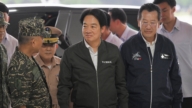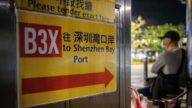【新唐人2012年8月20日訊】在香港市民登上釣魚島,被日本當局逮捕遣返之後,中國多個城市發生規模不一的遊行示威。警方在場維持秩序,沒有進行阻攔。中共在釣魚島主權問題上雷聲大雨點小,雖然平日有時候派出船只在釣魚島附近巡邏,但是香港市民登島以及被抓捕的時候,中共並沒有派出船只進行保護。學者指出,中共內心虛弱,但是借用「民族主義」轉移國內重重矛盾。
8月19號,廣州、深圳、安陽、南京、南寧、成都以及杭州等中國多個城市都出現了遊行示威,反對日本侵佔釣魚島。
週日上午在廣州,大批民眾在日本總領事館外,拿著國旗及寫上「誓死捍衛中國領土釣魚島」等標語的橫幅,呼喊抗議口號和靜坐,隨後遊行抗議。大批公安與武警車在附近戒備,公安更為遊行人士開路,但也有多名穿著迷彩服裝的人員手持攝錄器材拍攝。
示威活動提前在中午結束,發起人宣佈約900人參加,並透露,計劃向政府申請在廣州設立保釣組織分會,籌組珠江三角洲的漁民,一起出海到釣魚島宣示主權。
廣州畫家何國泉表示,反日遊行表面上看好像是自發的,事實上底下是有組織的。甚至有些是默許的。中共是在利用「民族主義」轉移國內矛盾。
廣州畫家何國泉:「在中國來講,你遊行示威這都是非法的,遊行都不允許的。但是就這東西還是允許的,警察也可以來開道的。警察站在旁邊不怎麼管的。中國有些一幫人在一起唸唸詩,只要人多了,他都來干預的。他這個反日大遊行上街是很反常的事情。那就是轉移目標嘛。國內的事情多了。維權的這些事情。」
首都北京沒有出現大規模反日示威活動,只有零星的民眾自發到日本駐華大使館外示威。
《長城抗戰網》主編賈元良認為,民眾反日遊行還是有意義的。
《長城抗戰網》主編賈元良:「第一表示愛國的熱情;第二也是對日本施壓的方式;第三,也是給政府看。民眾都有這個情緒來表達了,你政府不作出積極表達,還是口頭的方式,對政府來說也是臉上無光的事情。」
《中國洞察事務監督網》主編光遠認為,中共當局內心虛弱,並不敢對釣魚島主權採取實質行動。
《中國洞察事務監督網》主編光遠:「我覺得會大事化小,小事化了,不了了之。我個人感覺,這是我們善良的人的一種願望,武力奪回來。但是我想不可能的。中共現在一切都是維穩。(但是)不是說你政府想穩定就穩定了。」
深圳的反日遊行隊伍就比較激烈,一輛日本牌子的警車稍早時在路邊被推翻,部分民眾爬上警車用鐵棍敲打車身。當局增派警力維持秩序,並出動直升機監視情況,戴上頭盔與手持盾牌的武警趕到現場戒備。下午1點多突然天降大雨,有示威者質疑是直升機投下水彈。目擊者表示,群眾四散避雨時,被近百名武警包圍,有人遭公安勒脖子。
時事評論員林和立分析,北京開始擔心民族主義這把「雙刃劍」會反傷中共,如果大陸保釣人士將矛頭倒過來,指向姿態軟弱的中央政府,而傚法沿海城市的保釣人士,甚至出現雪球效應,令事情越演越烈。所以,北京當局只好「虎頭蛇尾」,低調解決事件。
一些學者及政界人士指出,北京及特區政府對這次保釣行動的態度,由最初默許甚至高調宣傳,後來卻以大事化小方式低調解決,相信令不少港人看清,中共利用民族主義包裝獨裁政權的本質,對港人來說是最好的國民教育。
採訪編輯/秦雪 後製/葛雷
Beijing Regime Utilizes Anti-Japan Demonstrations
Arrested Hong Kong citizens have been deported by
Japan after landing on the Diaoyu Islands (Uotsuri Jima).
After the incident, several demonstrations
erupted in several Chinese cities.
The protests were not stopped by the on-site police force.
In reality, the Chinese Communist Party (CCP)
has said a lot, but done very little about the issue.
Although it has ships patrolling near the Diaoyu Islands,
the regime did not protect the arrested Hong Kong citizens.
Scholars say that this issue
has exposed the CCP’s weaknesses.
The regime has actually utilized “nationalism" to transfer
public attention from the intense domestic conflicts it faces.
On August 19, demonstrations against Japanese occupation
of the Diaoyu Islands arose in a number of cities in China.
This included Guangzhou, Shenzhen, Anyang,
Nanjing, Nanning, Chengdu and Hangzhou.
In Guangzhou, outside the Japanese Consulate General,
the demonstrating masses held CCP flags and banners.
They chanted slogans, and staged sit-ins and marches.
Lots of police vehicles were alerted nearby.
Public security cleared a route for the parade.
Meanwhile, many people in camouflage
clothing were videotaping the scene.
Protests ended at noon, which was earlier than scheduled.
Organizers revealed approximately 900 people participated.
They applied to the authorities to set up Guangzhou
branch of an Association for Protecting the Diaoyu Islands.
According to organizers, fishermen in the Pearl River Delta
will proclaim sovereignty over on the Diaoyu Islands.
He Guoquan, a Guangzhou-based painter, has revealed
that anti-Japanese demonstrations seemed spontaneous.
In fact, the demonstrations were
officially organized and condoned.
The CCP was using the public’s “nationalism"
to transfer focus from internal contradictions.
He Guoquan: “The authorities ban mass protests in China.
But now they allowed such demonstrations and
the police even cleared the route for the march.
In China, police intervene in peoples group activities,
even if they have gathered to read poetry.
So the anti-Japanese parades were very unusual.
That actually helped the authorities to divert public
attention away from domestic issues like defending rights.”
No similar protest have occurred in Beijing, and people
only sporadically protested outside the Japanese Embassy.
Jiayuan Liang, Chief Editor of 『cckz1933.cn』 website,
commented that anti-Japanese demonstrations make sense.
Jiayuan Liang: “Firstly, it showed patriotic
enthusiasm. Secondly, it pressured Japan.
Thirdly, it pressured the government.
Even the people have stood up to express their feelings,
but the government is still inactive, only talking.
That is a dishonorable thing for the government itself."
Guang Yuan, Chief Editor of Dongcha.com, stated
that the CCP authorities do not dare to take real action to claim sovereignty over the Diaoyu Islands.
This is due to the CCP’s inner weakness.
Guang Yuan: “I believe the issue
will be minimized as much as possible.
We want to get back the territory by using force,
but that would be impossible, I guess.
Now the CCP does everything to maintain stability.
However, the stability isn’t relying on the wish of the regime”.
The anti-Japan demonstrations in Shenzhen were intense.
A Japanese brand of police car was overturned.
Some people climbed onto it, beating it with iron bars.
Local authorities dispatched police
and helicopters to monitor the situation.
Around 1pm, there was a sudden rain downpour.
Some protesters questioned whether
it was helicopter-dropped water bombs.
Witnesses said when the masses dispersed to take shelter
from rain, hundreds of armed police besieged them.
Some people were even strangled by the police.
Political commentator Willy Lam said that the
Beijing regime began to fear that the “double-edged sword" of nationalism may end up hurting the CCP itself.
The regime worries that activists for the Diaoyu islands
might turn this spearhead against the weak CCP regime.
A snowball effect might even be caused
in China, which will intensify the issue.
Therefore, the CCP authorities had to end
the issue quickly, and in a low-key manner.
Some scholars and politicians commented
on the authorities’ attitude taken toward the protest.
The Beijing regime and special district governments
began to condone and propagate a high profile for the protests, but downplayed the action in the end.
The way it has been handed has made the Hong Kong
people understand the CCP’s authoritarian nature.
This nature is packaged with nationalism.
It was the best education on this nature
for Hong Kong people, commentators have said.























